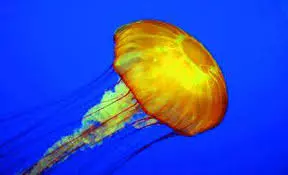Venomous Jellyfish Bloom Prompts Warnings on Visakhapatnam Coast

Visakhapatnam: Marine biologists are urging caution after discovering a bloom of venomous jellyfish, including the highly dangerous Pelagia noctiluca species off the coast here.
This sighting on Wednesday night raised concerns about swimmer safety. These jellyfish can inflict painful stings and even trigger life-threatening allergic reactions.
The Pelagia noctiluca, easily recognised by its mushroom-shaped head and trailing tentacles, is known to cause a range of illnesses, including diarrhoea, extreme pain, vomiting and anaphylactic shock.
Two decades ago, a similar jellyfish bloom was linked to the deaths of two swimmers in the Yarada area.
Experts believe the presence of these jellyfish blooms is linked to the rise in ocean temperatures, a trend associated with climate change.
Chakra Pranav, from the East Coast Conservation Team, emphasized the need for immediate action. "We urge the authorities to cordon off the affected beaches and issue advisories to prevent people from entering the water," he stated.
Professor Manjulatha, a marine biologist from AU, explained the lifecycle of jellyfish, highlighting their reproductive stage, where they attach themselves to the seabed. She said jellyfish primarily used their stinging cells for capturing prey and for self-defence; not to kill humans.
She likened jellyfish development stages to those of butterflies, highlighting their reproductive phase. Despite their defensive sting, they serve as a nutritional resource in some countries.
However, there is also some conflicting information. Balaram Naidu, a scuba-diving instructor, downplayed the threat, saying jellyfish stings are rarely life-threatening and are treatable. Scuba divers, he said, are not at risk as they avoid areas with high jellyfish concentrations.”
“While jellyfish may appear during climatic shifts, they're typically not life-threatening. They are found especially when nutrient levels rise in the sea. They tend to cluster in coastal areas, with their density fluctuating seasonally. Notably, precautions are taken to ensure the safety of divers when jellyfish are present in higher numbers.”
The authorities are however taking precautions. The presence of these venomous jellyfish necessitates public warnings and potential beach closures until the bloom subsides, they stress.

